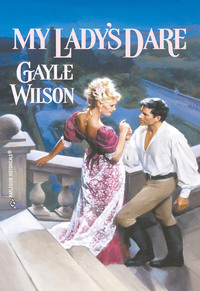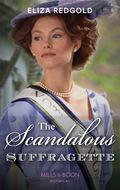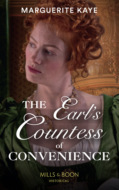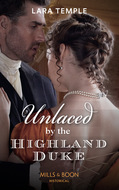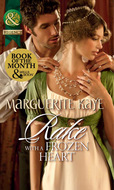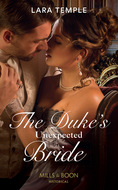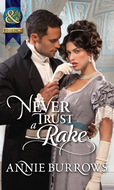Kitap dosya olarak indirilemez ancak uygulamamız üzerinden veya online olarak web sitemizden okunabilir.
Kitabı oku: «My Lady's Dare»
“The woman,” the earl said softly.
“I beg your pardon?” the Frenchman replied.
“You may wager the woman,” Dare said.
“Mrs. Carstairs?” Bonnet asked, his voice astounded. “But this is England, my lord. Not…” The Frenchman’s voice faltered, as if he could not think of a location where one might wager a human being.
“Indeed, it is,” Dare agreed. With one finger he touched the enormous pile of notes on the table between them. “And these are the coins of the realm. Quite a lot of them, as a matter of fact. I’ll wager them all, Mr. Bonnet, on one game. All of this for the woman.”
Bonnet’s eyes had followed the movement of the earl’s hand as it reached out and touched the money. And then they rose again, considering his opponent’s face. “One game?”
“Winner take all,” Dare said softly. “And the only stake you must put up is Mrs. Carstairs.”
Dear Reader,
Much of the beauty of romance novels is that most are written by women for women, and feature strong and passionate heroines. We have some stellar authors this month who bring to life those intrepid women we love as they engage in relationships with the men we also love!
We are very proud of Gayle Wilson, who has won awards for several of her Harlequin Historicals novels, as well as her contemporary romances for Harlequin Intrigue. Known for her gripping and original stories, Gayle’s latest book, My Lady’s Dare, is no exception. This Regency-set tale will grab you and not let go as the Earl of Dare becomes fascinated by another man’s mistress, Elizabeth Carstairs. Nothing is as it seems in this dangerous game of espionage that turns into an even more dangerous game of love!
In Bandera’s Bride, the talented Mary McBride gives her Southern belle heroine some serious chutzpah when, pregnant and alone, she travels to Texas to propose marriage to her pen pal of six years, a half-breed who’s been signing his partner’s name! And don’t miss Susan Amarillas’s new Western, Molly’s Hero, a story of forbidden love between a—married?—female rancher and the handsome railroad builder who desperately needs her land.
Jacqueline Navin rounds out the month with The Viking’s Heart, the sensational story of a fierce Viking who vows to save a proud noblewoman from a loveless arranged marriage.
Enjoy! And come back again next month for four more choices of the best in historical romance.
Sincerely,
Tracy Farrell,
Senior Editor
My Lady’s Dare
Gayle Wilson

MILLS & BOON
Before you start reading, why not sign up?
Thank you for downloading this Mills & Boon book. If you want to hear about exclusive discounts, special offers and competitions, sign up to our email newsletter today!
Or simply visit
Mills & Boon emails are completely free to receive and you can unsubscribe at any time via the link in any email we send you.
Available from Harlequin Historicals and GAYLE WILSON
The Heart’s Desire #211
The Heart’s Wager #263
The Gambler’s Heart #299
Raven’s Vow #349
His Secret Duchess #393
Honor’s Bride #432
Lady Sarah’s Son #483
My Lady’s Dare #516
Other works include:
Harlequin Intrigue
Echoes in the Dark #344
Only a Whisper #376
The Redemption of Deke Summers #414
Heart of the Night #442
*Ransom My Heart #461
*Whisper My Love #466
*Remember My Touch #469
Never Let Her Go #490
**The Bride’s Protector #509
**The Stranger She Knew #513
**Her Baby, His Secret #517
†Each Precious Hour #541
**Her Private Bodyguard #561
For my cousin Elizabeth—the pretty one
Contents
Prologue
Chapter One
Chapter Two
Chapter Three
Chapter Four
Chapter Five
Chapter Six
Chapter Seven
Chapter Eight
Chapter Nine
Chapter Ten
Chapter Eleven
Chapter Twelve
Chapter Thirteen
Chapter Fourteen
Chapter Fifteen
Epilogue
Prologue
Paris, 1813
The edge of the blade sliced through the skin of the Earl of Dare’s neck as its point thudded into the scarred wood at his back. Only a reflexive jerk of his head to the side had prevented the tip from piercing his throat instead of the door behind him.
With a lightning shift of balance, Dare thrust his own sword forward and into the chest of the man whose blade was momentarily useless, its tip embedded in the wood. When Dare pulled back his arm, the hiss of escaping air and the gush of blood that followed told him this fight was at an end.
The dying man slumped against him, and the earl supported the body with his sword hand while he sought for the latch of the door behind him with his other. Just as he found it, a cry went up from the courtyard in front of the house where he was hiding.
He didn’t know how the French had found him. It made no difference now. What was important was getting out without being seen or heard by the soldiers in the street. He opened the door, making as little noise as possible, and stepped out, pulling the body of the dead man with him into the concealing darkness of the night.
Dare tried to execute his missions when no moon rode the night sky. During those expeditions, which put him within the very heart of the enemy’s strongholds, he needed every advantage he and nature could devise. But with the relentless manhunt now being carried out through the winding Parisian streets, he would need more of those advantages than ever before.
The earl eased the body he’d been supporting into the shadows cast by the wide eves and pulled the door closed behind him. Then he leaned back against it as, breathing suspended, he strained to follow by sound alone the progress of the search.
The shouted commands and the noise of the milling horses all seemed to be coming from the crooked lanes that ran in front of the house. He could hear no movement here along the river, except for the occasional lap of water against one of the rotting piers that serviced the shops and houses that had been built along this embankment.
Using his teeth, the earl pulled the thin leather glove off his left hand and put his bare fingers against the wound on his neck. The cut had begun to burn, and he found it was bleeding more profusely than he would have liked, the blood warm and thick against the chill of his trembling fingertips.
He took his hand away, holding it by force of habit in front of him. The Stygian blackness of the alleyway, an odoriferous cobblestoned ribbon which followed the left bank of the Seine, prevented him from being able to see either blood or fingers.
Wiping the moisture on his cloak, Dare pulled the glove back on, again using his teeth to finish the job. He was still listening to the sounds of the hunt, ready to spring to action if his pursuers approached. He tugged his cravat higher around his throat, hoping it would catch the blood.
Eventually the searchers would bring torches to try to find any trace of their prey as the hunt fanned out along the riverbank. He couldn’t afford to leave a tell-tale trail of blood by which they could track him. Although he himself might be back in England by the time those droplets were discovered, the man in whose house he would take shelter tonight would not be.
And the Earl of Dare had a hard-earned reputation for protecting his associates. Anyone who didn’t wouldn’t last long in this business. The line of the earl’s mouth slanted suddenly. Despite his predicament, he was amused by that thought. Actually, no one lasted long in his business, no matter the care he took.
He had certainly been pushing his luck tonight. Of course, that was something he had always done. His brother Ian accused him of needing the thrill this dangerous game gave him. The narrow escapes. The occasional pursuit. Perhaps his brother was right, he admitted, his lips tilting again. After all, Ian usually was. Especially about his siblings.
Dare stepped away from the shadows of the building, moving with the graceful stealth of a hunting cat, the hilt of his sword still clutched in his hand. He carried a loaded pistol as well, but it was the blade that had saved his life tonight. As it had on more than one occasion. The sound of a shot in a Parisian street would undoubtedly be investigated by the authorities, but the whisper of a rapier, as quick and deadly as an adder’s strike, had never given away his location.
Once he had put some distance between himself and the yard of the house where he had left the dead man, the earl began to hurry. He moved almost soundlessly, his booted feet running lightly over the rough and broken stones. His eyes examined every patch of darkness that loomed ahead, but gradually the noise of the soldiers faded away behind him.
It wouldn’t be long before they found the body of the man he had killed, however. And when they did, he had no doubt that they would redouble their efforts. If only his famous luck would hold a little longer, he thought, recognizing that he was nearing his destination. Then the French would again be disappointed in their efforts to capture him.
Eventually, the earl slipped into a low stone doorway, ducking his head to accommodate his height to an entrance that had been constructed three centuries before. This area was one of the oldest in the city, the buildings still partially enclosed by the medieval wall.
Even without light, it was obvious he was in the right place. The scent in the low room was so strong it was almost taste. Dare stood a moment, his nose raised like a hound’s, breathing in the thick air, richly pungent with hops and malt.
“Running late are you, my lord?” a voice asked. The accent was English, broadened by the speaker’s obvious Yorkshire heritage. “I was beginning to get worried.”
“Someone tried to slice my gullet,” Dare explained, closing the heavy door by which he had just entered and throwing the iron bolt across it. “I was forced to…dissuade him.”
As soon as the lock shot home, he heard the sound of a flint, and the pale, wavering thread of fire it had produced gradually became a glow. Then slowly, out of the shadows beside the strengthening light, a face, Mephistophelianlike, floated into view.
Unlike the voice that had preceded them, its features were nondescript, as easily French or Italian as British: dark eyes, an undistinguished jut of nose, a wide, generous mouth, arranged in a grin. And all of them surmounted by mouse-brown hair, which had been tied back in a neat queue.
“Oh, you ain’t gone and bloodied your linen, have you, my lord?” the earl’s valet asked plaintively. “You’ve no idea what a time I have with bloodstains. And you would be wearing one of our new cravats.”
“I’ve almost been beheaded, Ned, and all you can worry about is the state of my cravat,” the earl said, laughing. He slipped the woolen cloak off his shoulders and threw it carelessly over a convenient cask.
“It’s not just the linen that’s the problem,” Ned Harper said. “It’s the lace as well. Hard to come by now that Nappy’s got the continent tied up.”
“Perhaps we might shop for a yard or two before we leave Paris,” Dare suggested politely.
He crossed the room to where his valet was standing and took the brimming mug held out to him. The earl raised the cup and drank down its contents in one long quaff, then lowered it to look into his servant’s eyes.
“He wasn’t there,” Dare said softly, and watched the laughter fade from Ned Harper’s face.
“Damn,” the smaller man said feelingly.
“Bloody right,” agreed the earl. “He wasn’t there, and the gendarmes were.”
There was a long silence as his valet considered the information. “Someone told them you were coming.”
“There was only one man who knew that.”
“He’d never talk,” Harper declared with conviction.
“Anyone can be made to talk,” the earl said softly. “There are things which may be done to a man….” The words faded, and again the Earl of Dare’s eyes met those of his friend. “Anyone can be made to talk,” he finished simply.
Harper nodded, his gaze still locked on the earl’s classically handsome face. The grin with which he had greeted his master was gone. Perhaps he was thinking, as Dare was, of the terrible things that were done to prisoners in France today. The same unspeakable tortures that had once, a long time ago, been carried out in the bowels of England’s own dungeons.
“Then…we have to get him out,” Harper said. “Out of Paris. Out of the country.”
“Indeed,” the earl said, his eyes, made sapphire by the lamplight, were no longer focused on his valet’s face. They were gazing instead, unseeing, into the heart of the flame.
“What will you do?” Harper asked.
“First, we shall have to find him. Which may take some time.” The earl’s voice faltered again as his imagination visited the prison where his friend would be held while his enemies tried to extract information from him. Information about his contacts in espionage, such as the earl himself.
“And time, Ned…” Dare continued after a long silence, his voice very soft. “Time is now a luxury we no longer have.”
Chapter One
London, three nights later
“If all goes according to plan, my dear, we shall have a very special guest tonight,” Henri Bonnet said, smiling with undisguised satisfaction. “One to whom I wish you to be especially attentive.”
Elizabeth Carstairs’ eyes lifted to the reflection of her employer’s in the mirror above her dressing table. She said nothing, however, and after a moment she returned her attention to the task of darkening the pale lashes above her blue eyes.
The Frenchman strode angrily across the room and caught her chin in his fingers, roughly turning her to face him. “A very special guest,” he said again, each word sharp and distinct. “Do you understand me, Elizabeth?”
“Of course,” the Englishwoman said. Neither her face nor her voice expressed dismay at the gambler’s treatment of her.
For the past two years, Elizabeth Carstairs had had little control over any aspect of her life except her demeanor. And she had decided from the beginning that Henri Bonnet would never be allowed to know what she was thinking. Or feeling.
Still gripping her chin painfully, Bonnet turned her face toward the light of the lamp on her dressing table. He examined it critically before he dipped one finger into a pot of rouge, which was standing open on the dresser. He added more color to her lips and then to her cheeks, blending the rouge into the small amount she had already applied.
He stepped back, his head tilted, still assessing. Then he touched the sleeve of the blue gown she was wearing, flicking its edging of lace dismissingly. “And wear the red, I think, rather than this. We are entertaining someone important, Elizabeth. Someone very important. And I’m counting on you, of course, to do your part,” he added softly.
Without waiting to see if she would obey his command to change—because he knew that she would—the gambler turned, leaving her alone in her bedroom. Her eyes returned to the reflection in the mirror. She watched her lips tighten in anger, and then using the tips of her fingers, she scrubbed at the rouge, trying to remove it from her cheeks.
After a moment, the movement of her fingers stopped, and she leaned forward, staring intently into the eyes of the woman in glass. Slowly she shook her head, a single negative movement. Then she rose, her fingers working over the buttons down the back of her bodice, preparing to put on the dress the gambler had instructed her to wear. Her lips were set, her eyes cold, and after she had changed, she never looked again into the mirror.
“So good of you to honor us with your company, my Lord Dare,” Henri Bonnet said.
The Frenchman bowed from the waist. His left hand, graced by a brilliantly faceted emerald ring, made a sweeping gesture toward a large gaming table, which had been set up in one of the private salons of his elegant London hell.
There were two empty chairs at the table. The other four were occupied by gentlemen of the earl’s acquaintance, who had obviously been awaiting his arrival. Dare’s gaze skimmed almost insultingly over his host, not even acknowledging his bow. He considered the group at the table, his eyes resting briefly on the face of each man.
“I believe you know everyone,” the Frenchman added, his tone expressing no displeasure that the earl had failed to respond to his effusive greeting. However rude the earl might be, they all knew the gambler couldn’t afford to offend so wealthy a patron.
All conversation at the table had come to a halt with the earl’s arrival, and every eye was focused on the figure poised in the doorway. Despite the fact that he had reached his London town house less than an hour ago, Dare knew there was nothing to criticize in his appearance. With Harper’s assistance, and according to the reassuring reflection in his mirror, he had again achieved the sartorial elegance for which Valentine Sinclair, the Earl of Dare was justly famous. Or perhaps justly infamous, he thought, mocking his own carefully constructed reputation.
It was said that some of the younger members of the beau monde had once tried to estimate the cost of the clothing Dare had worn to some court occasion, even going so far as to place wagers on the amount in the betting books. Despite the fact that he was known for indulging his expensive taste to the utmost, the sums Dare heard mentioned in that incident hadn’t even approached the amount he had actually spent.
And spent for a good cause, he acknowledged, bowing formally toward the Duke of Pendlebrooke, the only man present who outranked him. Dare’s attention to fashion was part of his ongoing masquerade. As were most of his excesses, including the one he would engage in tonight.
“Gentlemen,” Dare said, inclining his head to the men at the table, “I bid you good evening. And offer my abject apologies to have kept you waiting. My man was singularly inept tonight.”
Forgive me, Ned, Dare thought, as he made that ridiculous statement. Harper’s reputation rivaled Dare’s own among the fops of the ton, and they laughed together about the secret offers the valet received, attempting to lure him away from his employer.
“I throw myself on your mercy and beg your forgiveness for my tardiness,” Dare finished with the slightest bend of his upper body. His tone somehow made it obvious that he didn’t really give a tinker’s damn whether or not they forgave him.
As he bowed, Dare’s fingers unobtrusively touched the heavily starched cravat around his throat, tied tonight in an intricate style that bore his name. He eased the cloth upward, although Harper had assured him the gash was completely covered.
Adjusting his clothing once he had left his dressing room was something that Dare, like Brummel, ordinarily would never have done. However, revealing that he bore a sword cut on his neck would be a far more serious faux pas. A wound of that nature would be totally out of character for the Earl of Dare that London believed she knew.
Despite his apology for being late, Dare crossed the room as unhurriedly as if he were strolling along the shop windows on Bond Street. With impeccable timing, Bonnet’s servant pulled out the empty chair on the nearer side just as Dare reached the table. Gracefully adjusting the tail of his coat, the earl sat down, blue eyes again considering the men who were very shortly to become his opponents.
Although he had rather be almost anywhere else on earth than here, Dare’s face reflected nothing of that feeling. Only a languid boredom was allowed to play across his features. The expression appeared to be habitual and, like his clothing, was frequently aped by aspiring dandies, who hoped to achieve this same air of elegantly detached ennui.
The earl was not, however, suffering from boredom. He was grief-stricken and furious, exhausted from a more than forty-eight hour lack of sleep, and sickened by the events of the three days he had just spent in France.
He had kept this engagement tonight only because not appearing might have called into question his whereabouts during those days. And the fact that a dear friend had died in his arms today would not have served as an excuse for his absence. After all, given Dare’s reputation, most people would be surprised had he claimed to possess a friend. Certainly not one who had been willing to give his own life to protect the earl’s.
Remembering that sacrifice, Dare’s lips flattened, almost imperceptibly. Emotion was something he could not allow, of course, so deliberately he forced from his mind the image of the broken body he had held. He could not afford to let his failure in France interfere with his purposes here, which were perhaps as important as the ones which had taken him to the continent.
Henri Bonnet entertained the most influential men in the British capital, including those who ran the Horse Guards and those who sat in the House of Lords and occupied positions of authority within the current government. Talk of politics and war flowed as freely at these tables as did the Frenchman’s wine, which made this house an excellent source of information.
Bonnet was openly contemptuous of the Corsican upstart who occupied the throne of France. Reportedly the descendent of a family prominent in the ancien régime, Bonnet had come to England at the height of the Revolution. With no skills and little money, the former aristocrat had opened a small gaming house where, he had proclaimed, there would never be a betting limit.
His establishment had become the most popular gaming hell in the city and was now housed in this magnificent Palladian town house. And there was still no limit on what could be staked on the turn of a card or the spin of the wheel.
“Would you care for wine, my lord?” Bonnet asked.
Looking up, Dare realized that the servant who seated him had disappeared. A woman now stood beside his chair, holding a silver tray on which stood a decanter of claret and a single goblet. The light from the candles which illuminated the room was refracted from the crystal, turning the wine a rich ruby red.
The woman’s gown, expertly fashioned from a heavy satin of almost that same hue, was cut straight across and very low over the swell of her breasts. In contrast to the jewellike tones of the fabric, her skin was luminous as pearl, shaded with gold by the flattering candlelight.
Looking up into her eyes, Dare realized they were as blue as his own. As she waited, they rested on his face with a patent disinterest. Dare’s features had evoked a myriad of responses from women through the years. Disinterest, however, had never been one of them, and it intrigued him.
To his very experienced eyes, it was apparent her face had been painted, although it had been done with an expert hand. The use of cosmetics, which no respectable Englishwomen of his class wore, of course, told the earl a great deal. Her hair, silver-gilt in the candlelight, was dressed very simply in a style that any hostess of the ton might have worn. Loose curls, tumbling artlessly above the flawless oval of her face, had been threaded with a single strand of what appeared to be genuine rubies.
“My lord?” she inquired softly. One fair eyebrow arched with her question.
“Of course,” Dare said, realizing that in his fascination he had never answered Bonnet. Even to his own ears, his voice as he did sounded unnatural, almost husky, touched with emotion.
Surprisingly, he found himself still watching the woman as she handed the tray to the manservant. She removed the decanter with a graceful economy of motion and poured wine into the goblet, which she had set on the table. She never looked at Dare during the process.
As she bent over him, however, the earl was suddenly surrounded by the subtle scent she wore. Not the familiar rose or lavender waters favored by the women of his set. This was something darker, heady with musk, sensually evocative, and almost certainly French.
When the woman straightened and began to turn to put the decanter back on the tray, Dare spoke, his accent deliberately no better than the average Englishman’s, although he had been fluent in French since childhood. “Merci, mademoiselle.”
“But Mrs. Carstairs is a countrywoman of yours, my lord,” Bonnet corrected, his tone verging on amusement.
“Indeed,” Dare said, pretending to study her features as if her nationality might somehow be revealed by them. “I’m sure I should never have guessed. My compliments, madam.”
At his words, she turned back, the decanter still in her hands. From the look in her eyes, the earl could not be perfectly certain she wasn’t about to throw it at his head.
“Your…compliments, my lord?” she asked.
“For being English, of course,” the earl said, his lips tilting. “Why, whatever did you think I meant, Mrs. Carstairs?”
“I thought you were complimenting me that I didn’t appear to be English.” Her eyes challenged him a moment before she added, her tone conciliatory, as befitted someone in her position. “Obviously, I was mistaken. Pray forgive me, my lord.”
“Had I meant that, madam,” Dare said smoothly, “then I should be the one to beg your forgiveness.”
“There is no need for your apologies here, Lord Dare,” Bonnet said laughing. “Whatever your meaning. Elizabeth is here to serve you. If there is anything you should require during your visit, anything at all…” The Frenchman paused and again gestured expansively, this time seeming to include the woman and the servant behind her, who was still holding the tray. “Please don’t hesitate to make your wishes known. Any of my servants will be pleased to accommodate so welcome a guest. In any way you desire,” he added, his voice soft, and his eyes on the woman.
There had been an obvious undercurrent in the suggestive words, and Dare found himself interested in Elizabeth Carstairs’ reaction. Her eyes met Bonnet’s. Dare was unable to see what was in them, but there was no doubt about the rush of color that ran beneath the translucent skin of her throat and spread upward into her cheeks, far more pronounced than the rouge.
The intent of Bonnet’s offer had probably been clear to everyone. Mrs. Carstairs’ “services” were available to the Earl of Dare, and perhaps even to the rest of them. Given the character of women who were usually employed in a gaming hell, there had been nothing particularly startling about the Frenchman’s offer. What had been surprising was Mrs. Carstairs’ response. Seldom had the earl encountered a demimondaine who had the capacity to blush. Or, he admitted admiringly, the courage to parry wits so openly with one of her employer’s guests.
“You are too kind, sir,” Dare said, inclining his head.
The gambler had introduced her as Mrs. Carstairs, but that title was almost certainly a sop to convention. In England, any unmarried woman living under a man’s protection was referred to in such a way. It was a ridiculous pretense, but then much about the conventions of their society was ridiculous.
At Dare’s expression of gratitude, Elizabeth Carstairs had turned her head. Her eyes met his. In them, quite clear, was rage. And beneath that unspoken anger was pain, an agony perhaps as deep as that which he had seen in the eyes of the man whose tortured body he had held today as he drew his last breath. For a moment the force of her anguish was so strong and communicated to him so forcefully that it literally took his breath.
It had not been an appeal. He had no doubt that the revelation had been unintended. Perhaps if he had not had so recent an experience with suffering, he might not even have recognized what he had seen.
Breaking the contact that had briefly flared between them, Elizabeth Carstairs turned, calmly replacing the decanter on the tray and stepping away from the table. Dare heard the fabric of her gown whisper as she moved, and the hint of her perfume lingered in the air, but he could no longer see her face.
And he found he really wanted to. A discovery that was almost as shocking to the Earl of Dare as Elizabeth Carstairs’ unexpected reaction to Bonnet’s offer had been.
“Gentlemen,” the Frenchman said, “shall we begin?”
It was almost dawn. A thin, watery daylight was beginning to creep between the folds of the thick velvet curtains that had been pulled to keep it out. A pall of smoke, floating a few inches off the floor, hung over the Turkish carpets. Several of the candles had guttered and gone out, and there was no more conversation.
No one had yet left the table, although now only two men were playing. And it was obvious that very soon one of those two would be the victor.
The heap of notes piled carelessly before the Earl of Dare had steadily grown during the last few hours. The stack that stood before Bonnet had conversely shrunk until only a handful of what had been there at the beginning of the evening was left. And the fickle cards, like a woman enamored with one gallant, continued to favor the earl.
“Capet,” Dare said. “Forty points, and my game, I believe.”
There was no tally sheet beside his long-fingered hands that rested, totally relaxed, against the surface of the table. The totals were kept in his head, and in every instance Dare’s calculations had matched those announced by Elizabeth Carstairs, who stood slightly to the right and behind Bonnet’s chair.
Ücretsiz ön izlemeyi tamamladınız.
